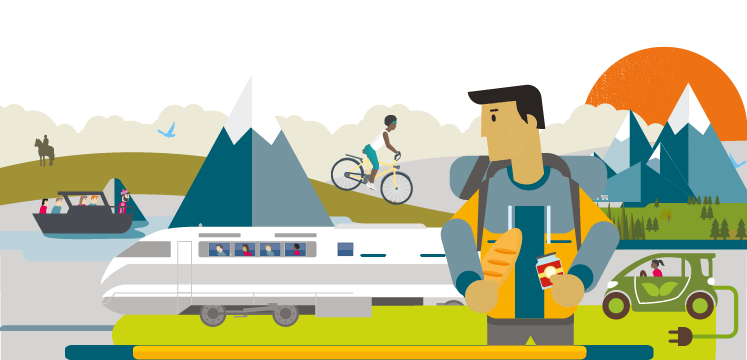
Before Covid-19, over 85% of visitors arrived to the Lake District by private motor vehicle, and this proportion has increased further since ‘lockdown’ restrictions have eased. The challenge for the Lake District is to be a place where everyone, regardless of wealth or ability is able to access, via different modes of transport, the national park sustainably.
Low carbon travel needs to be the obvious and most attractive choice for essential and leisure travel. The nation’s mental and physical health benefits from active travel in an inspirational landscape need to be secured.
The following overarching principles will steer the Sustainable Travel and Transport Key Outcome Group in its delivery:
STT.act.1
Advocate and support initiatives for multi-modal ticketing and enhanced connectivity from the West Coast Mainline between Penrith and Keswick and from Oxenholme and Windermere Stations.
STT.act.2
Support councils and community rail partnerships to progress rail upgrades on all Cumbrian lines, including Lakes Line capacity, Cumbrian Coast Line signalling, electrification of the Lakes and Furness Line, station accessibility improvements and improved stopping frequency at and the ability to travel between Penrith and Oxenholme.
STT.act.3
Partners to promote public transport and active travel in their communications. The Key Outcome Group will support them to provide sustainable travel itineraries, information, ticketing linked with attractions and accommodation and to maximise the use of the ‘You Smart Thing’ travel information.
STT.act.4
Work in partnership to secure the decarbonisation of transport, including: rolling out EV charging.
STT.act.5
Develop high quality active travel measures, including: develop cycle corridors and spurs set out in the Cumbria Transport Infrastructure Plan, deliver the Borderland See More Lake District projects and work with Active Travel England to develop priority networks within the Lake District using funding allocated.
STT.act.6
Work with communities to pilot sustainable travel improvements including potential integrated traffic management schemes, and delivering the actions from the Keswick Transport Study.
STT.act.7
Use results from the research project ‘Comparing attitudes and behaviour for visitors and residents in terms of how they would like to move around the park’ to develop and support delivery of a list of SMART actions.
STT.act.8
Work with Cumberland Council and Westmorland and Furness Council to deliver and promote bus service improvements through the revised Bus Service Improvement Plan, Rural Mobility Fund pilots and through partnership working at the Enhanced Partnership.
STT.act.9
Deliver better facilities at transport hubs including Penrith and Oxenholme Railway stations and Ambleside Bus Station.
STT.act.10
In order to reduce carbon emissions and be more inclusive, all Partners to commit to a reduction in staff and visitor travel and travel-related carbon emissions through continuing opportunities for virtual working, meetings and events, and meetings in public transport and disabled accessible locations.
STT.act.11
Develop accessible and inclusive active travel opportunities including developing and promoting the Miles without Stiles network and increasing availability of equipment hire such as off-road mobility scooters.
A number of additional actions we aim to deliver are identified in the list showing how we will deliver the Sustainable Development Goals.
Background information is available for this key challenge.
More information can be found in the research framework section.
This challenge does not operate in isolation, you may also be interested in the four other key challenges: